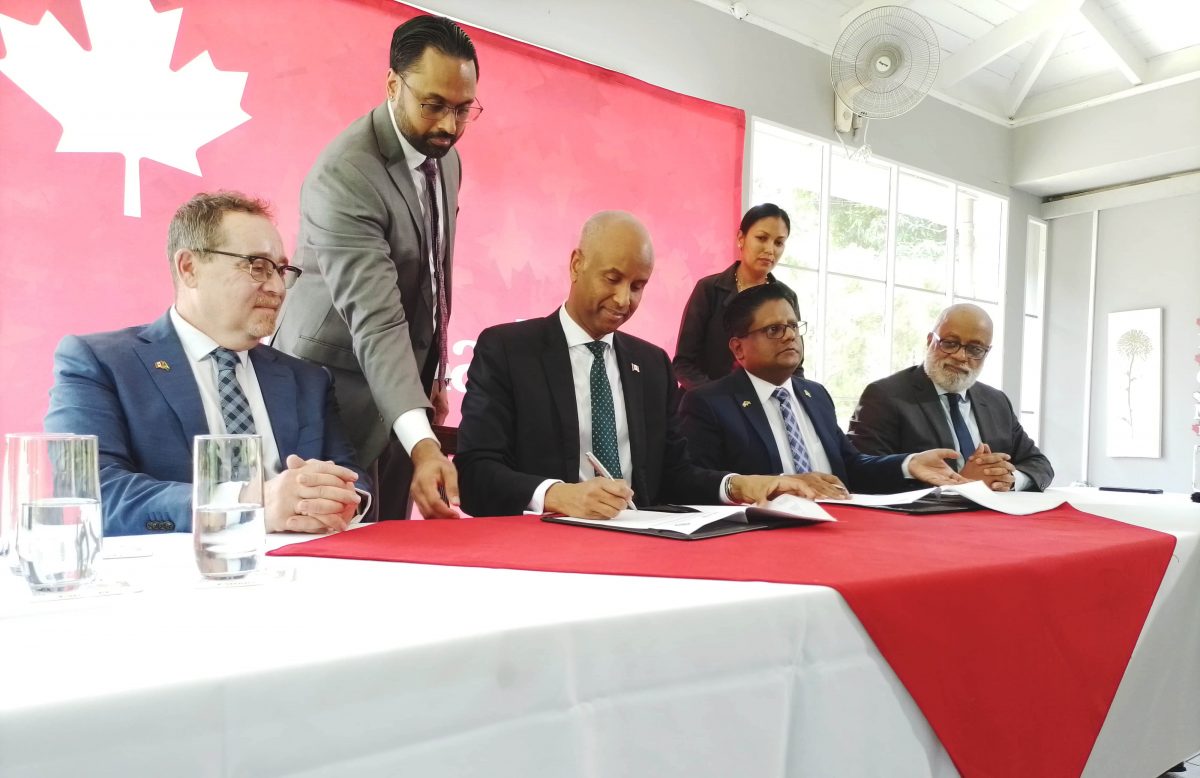A Cdn$120 million sovereign loan agreement was signed yesterday between the governments of Guyana and Canada to aid with the development and protection of vulnerable groups here.
The agreement was inked by Guyana’s Finance Minister Dr Ashni Singh and Canada’s Minister of International Development Ahmed Hussen, at the Residence of the Canadian High Commissioner in Bel Air, Georgetown.
Speaking at the signing, Hussen detailed that the sovereign loan programme would be utilised to improve social protection under the Ministry of Human Services and Social Security in areas such as digital transformation, old age pensions, gender-based violence, persons living with disabilities and human trafficking.
The minister remarked,“It is about protecting the most vulnerable populations. It’s about making sure that as we grow our economies, we promote gender empowerment, and we fight gender-based violence. It’s about empowering people with disabilities and enabling them to participate fully in the economy and the society of Guyana.
“Our retirees deserve a life of dignity, of respect, after working so hard.”
The politician is visiting Guyana for the first time and will be participating in the 46th Regional Meeting of the Conference of Heads of Government of the Caribbean Community (Caricom).
Hussen said that Guyana is the first country in the western hemisphere to benefit from the sovereign loan programme which provides loans on concessional terms to eligible countries, tailored to their needs and priorities.
The Canadian government functionary said that the loan agreement also signals the “next level of collaboration” between Ottawa and Georgetown.
Canadian High Commissioner Mark Berman also called the loan agreement monumental.
“Today’s ceremony is symbolic of the partnership between Canada and Guyana and it highlights the loan agreement that supports Guyana’s efforts towards strengthening social services for its citizens, in particular the most vulnerable,” Berman stated.
“It involves a significant amount of hard work, long hours, significant collaboration and compromise by all teams from the Government of Canada, the Government of Guyana and the Inter-American Development Bank.
“Canada will continue to support Guyana’s capacity-building efforts with Canadian experts assisting various institutions.”
Responding, Singh noted that Canada has continuously supported the country’s bauxite, gold and mining sectors respectively and contributed significantly to the development of areas such as health care, education, and social services.
He said that the landmark sovereign loan agreement represents another instalment in the longstanding and special relationship that exists between the two countries.
“Guyana is particularly proud of the fact that we are the third country in the world to have concluded a sovereign loan programme with Canada,” he said.
According to Singh, as the land of many waters continues along the path of economic development and transformation, support for vulnerable groups is required more than ever. He therefore welcomed the initiative and deemed it substantial
Guyana is one of Canada’s largest merchandise trading partners in Caricom.
In 2022, merchandise trade totalled $294.1 million. Exports for 2022 were valued at $52.7 million, imports were valued at $241.4 million. Canadian mining companies are actively exploring Guyana, while Canadian companies are seeking joint ventures in Guyana’s oil and gas market. A Canada-Guyana Chamber of Commerce was launched in Georgetown in December 2020 and an Air Transport Agreement is being finalised.
Due to the Commonwealth Caribbean Countries Tariff – an economic and trade development assistance programme for Commonwealth Caribbean countries and territories established by Canada in 1985 – and Canada’s other tariff preference measures, 94% of all Caribbean exports to Canada enter duty-free.
Canada has continued to extend its support to Guyana through programmes, encompassing essential maternal, newborn, and child health services for Indigenous communities and remote hinterland populations lacking access to quality healthcare.
During the COVID-19 crisis, Canada redirected programming to respond to needs in Guyana and the Caribbean, including addressing gender-based violence, income support and essential services, training and technical assistance for health professionals, as well as medical supplies and personal protective equipment.
The country’s principal means of support to the Caribbean is technical assistance and training to increase the capacity of governments and organisations.
The Canada-Caricom Expert Deployment Mechanism provides technical assistance to Caricom governments to help diversify and strengthen their economies, build climate-resilient communities, and reduce gender and economic inequalities.
Another collaborative initiative involves bringing Canadian and Guyanese colleges together for technical and vocational training in the renewable energy space.
Guyana also benefits from the Canada Fund for Local Initiatives, and Canada’s support through non-governmental and multilateral organisations, such as the Caribbean Development Bank.
The two countries have enjoyed bilateral relations for more than 50 years. Canada first opened it’s High Commission of Canada to Guyana, in Georgetown, in March 1964, and established full diplomatic relations after independence in May 1966.
Notably, the bilateral relations between Canada and Guyana have catapulted hundreds of students to study in the North American country every year, according to information published by the Government of Canada on its webpage.
Guyana is represented in Canada by its High Commission in Ottawa and a Consulate in Toronto.





